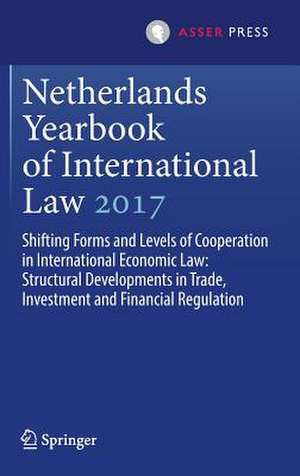Netherlands Yearbook of International Law 2017: Shifting Forms and Levels of Cooperation in International Economic Law: Structural Developments in Trade, Investment and Financial Regulation: Netherlands Yearbook of International Law, cartea 48
Editat de Fabian Amtenbrink, Denise Prévost, Ramses A. Wesselen Limba Engleză Hardback – 5 iul 2018
The Netherlands Yearbook of International Law was first published in 1970. It offers a forum for the publication of scholarly articles in a varying thematic area of public international law.
Din seria Netherlands Yearbook of International Law
- 27%
 Preț: 1449.70 lei
Preț: 1449.70 lei - 27%
 Preț: 1357.63 lei
Preț: 1357.63 lei - 27%
 Preț: 2165.55 lei
Preț: 2165.55 lei - 15%
 Preț: 654.30 lei
Preț: 654.30 lei - 20%
 Preț: 584.19 lei
Preț: 584.19 lei - 15%
 Preț: 650.69 lei
Preț: 650.69 lei - 15%
 Preț: 663.27 lei
Preț: 663.27 lei - 18%
 Preț: 971.49 lei
Preț: 971.49 lei - 15%
 Preț: 664.11 lei
Preț: 664.11 lei - 15%
 Preț: 661.84 lei
Preț: 661.84 lei - 15%
 Preț: 664.61 lei
Preț: 664.61 lei - 15%
 Preț: 658.70 lei
Preț: 658.70 lei - 15%
 Preț: 651.02 lei
Preț: 651.02 lei - 15%
 Preț: 653.14 lei
Preț: 653.14 lei - 20%
 Preț: 557.76 lei
Preț: 557.76 lei - 15%
 Preț: 644.95 lei
Preț: 644.95 lei - 15%
 Preț: 644.30 lei
Preț: 644.30 lei - 15%
 Preț: 653.14 lei
Preț: 653.14 lei - 18%
 Preț: 959.82 lei
Preț: 959.82 lei - 18%
 Preț: 1229.91 lei
Preț: 1229.91 lei - 15%
 Preț: 641.53 lei
Preț: 641.53 lei - 18%
 Preț: 895.76 lei
Preț: 895.76 lei - 18%
 Preț: 952.26 lei
Preț: 952.26 lei - 18%
 Preț: 953.65 lei
Preț: 953.65 lei
Preț: 1231.64 lei
Preț vechi: 1501.99 lei
-18% Nou
Puncte Express: 1847
Preț estimativ în valută:
235.71€ • 245.17$ • 194.59£
235.71€ • 245.17$ • 194.59£
Carte disponibilă
Livrare economică 24 martie-07 aprilie
Preluare comenzi: 021 569.72.76
Specificații
ISBN-13: 9789462652422
ISBN-10: 9462652422
Pagini: 459
Ilustrații: XXII, 454 p.
Dimensiuni: 155 x 235 mm
Greutate: 0.84 kg
Ediția:1st ed. 2018
Editura: T.M.C. Asser Press
Colecția T.M.C. Asser Press
Seria Netherlands Yearbook of International Law
Locul publicării:The Hague, Germany
ISBN-10: 9462652422
Pagini: 459
Ilustrații: XXII, 454 p.
Dimensiuni: 155 x 235 mm
Greutate: 0.84 kg
Ediția:1st ed. 2018
Editura: T.M.C. Asser Press
Colecția T.M.C. Asser Press
Seria Netherlands Yearbook of International Law
Locul publicării:The Hague, Germany
Cuprins
Part I. Shifting Forms and Levels of Cooperation in International Economic Law.- Chapter 1. The Development of the US and the EU Preferential Trade Agreement Networks: A Tale of Power and Prestige.- Chapter 2. From the Tripartite to the Continental Free Trade Areas: Designs, Outcomes and Implications for African Trade and Integration.- Chapter 3. From TRIPS to FTAs and Back: Re-Conceptualising the Role of a Multilateral IP Framework in a TRIPS-Plus World.- Chapter 4. External Consultants as Actors in European Trade and Investment Policymaking.- Chapter 5. Prosumers: New Actors in EU Energy Security.- Chapter 6. The Role of Sub-National Actors in International Economic Relations: A Case Study of the Canada-European Union CETA.- Chapter 7. The Potential of Transnational Regulations: The Interactions Between Traditional and Non-Traditional Sources of International Economic Law.- Chapter 8. International Regulatory Cooperation in the Field of Sanitary and Phytosanitary Measures: Drawing Multilateral Lessons from the Regional.- Chapter 9. The Growing Tendency of Including Investment Chapters in PTAs.- Chapter 10. Trade in the Digital Era: Prospects and Challenges for an International Single Window Environment.- Chapter 11. Between Shifts and Continuum in Cooperation: The International Securities Regulatory Regime and its Gradual Evolution.- Part II. Dutch Practice in International Law.- Chapter 12. The UN Guiding Principles on Business and Human Rights in (National) Action: The Dutch Agreement on Sustainable Garments and Textile. Chapter 13. Recognition of Sign Language Under International Law: A Case Study of Dutch Sign Language in the Netherlands.
Textul de pe ultima copertă
This Volume of the Netherlands Yearbook of International Law explores emerging trends and key developments in international economic law. It examines shifts in the levels of cooperation (from multilateral to plurilateral, regional or bilateral—or vice versa), and shifts in the forms of cooperation (new types of actors and instruments). These trends are analysed both from a conceptual and a practical perspective, with contributions addressing drivers for change, historical perspectives, future developments, and evolutions in specific policy fields. While a focus on international economic law may certainly not tell the whole story in relation to shifts in levels and forms of international cooperation, it does allow for a more detailed analysis of some of the important trends we currently witness.
The Netherlands Yearbook of International Law was first published in 1970. It offers a forum for the publication of scholarly articles in a varying thematic area of public international law.
Caracteristici
Provides in-depth reflections on key developments and emerging trends in international economic law Explores shifts in forms and levels of international cooperation from both conceptual or practical perspectives Includes contributions on recent developments regarding Dutch practice in international law
